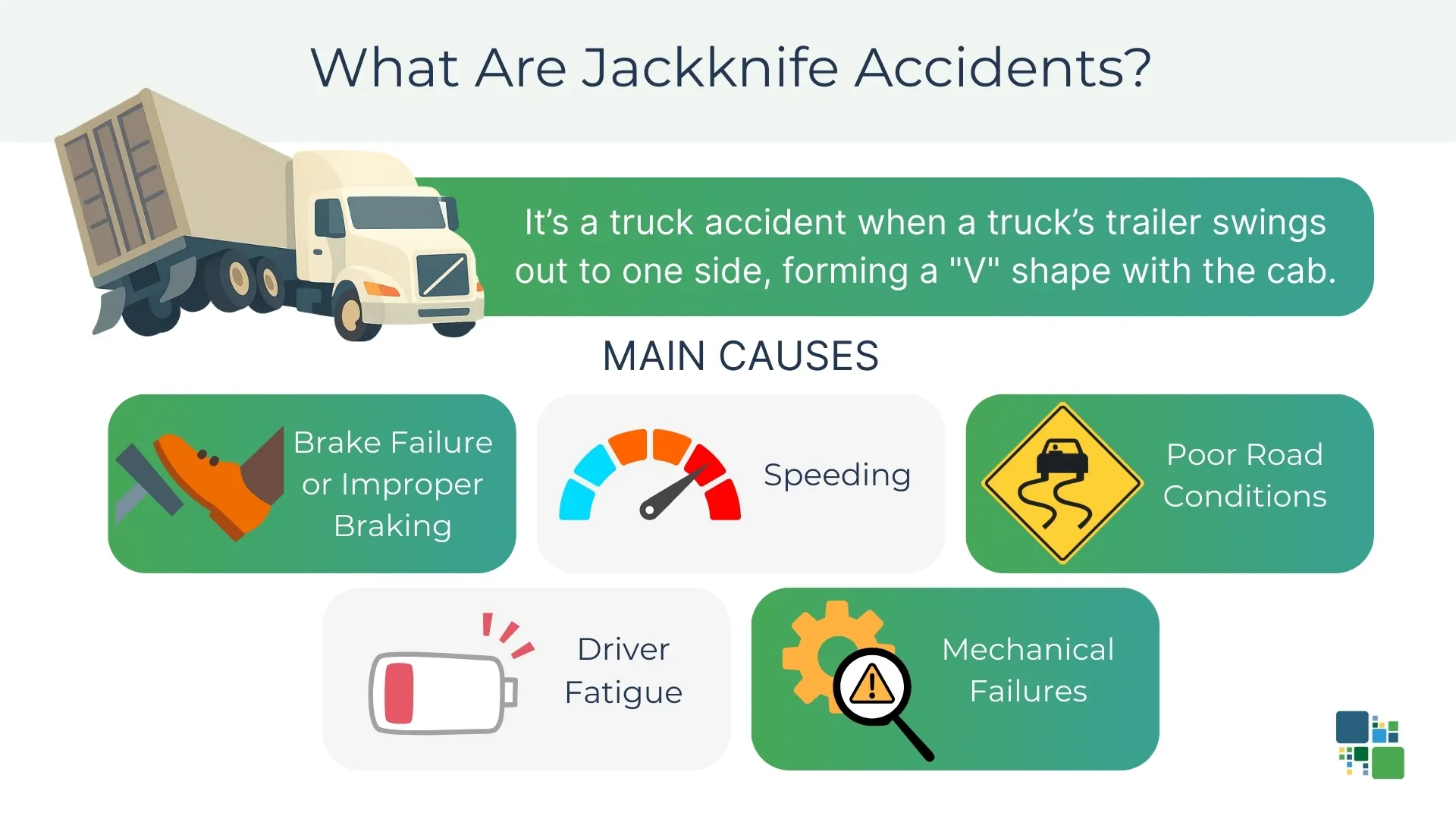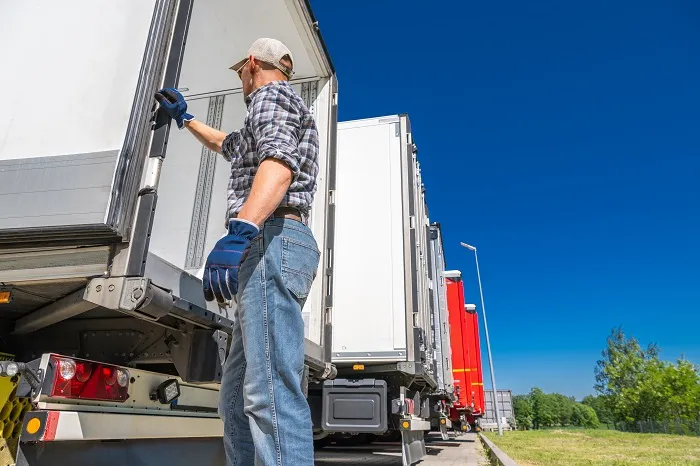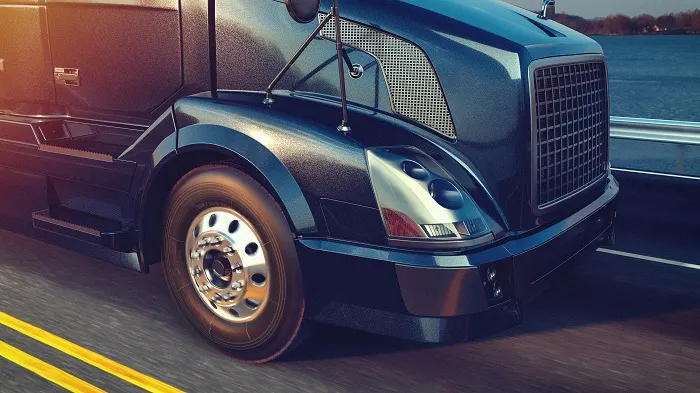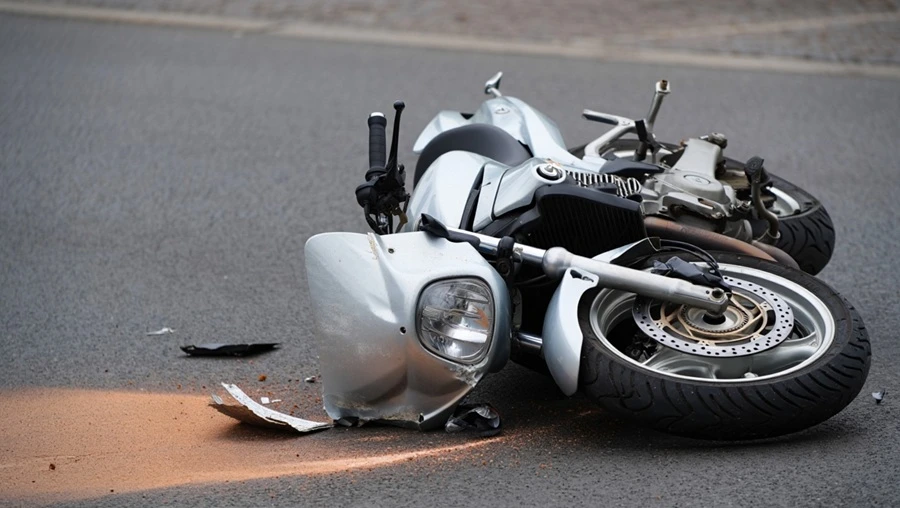Jackknife Accidents: Main Causes, How to Prove Fault and Get Compensation in Texas
Truck accidents can be catastrophic, especially when they involve a jackknife. If you’ve been involved in such an accident in Texas, you might be facing exorbitant medical bills, lost wages, and emotional distress.
I’m Ashley Applewhite, founder and lead attorney at Applewhite Firm PLLC. I handle truck accident cases throughout Austin, Texas, and I’m here to guide you through every step of the legal process.
This blog will explore the main causes of jackknife accidents, what to do after one, how to prove fault, and why it’s important to work with an attorney to get the compensation you deserve.
What Are Jackknife Accidents?
A jackknife accident happens when a truck’s trailer swings out to one side, forming a "V" shape with the cab and often causing a violent crash. These accidents can be devastating due to the size and weight of the truck, potentially leading to serious injuries or even fatalities for all parties involved.
Jackknifing is common in truck crashes, and knowing what causes this phenomenon — and what to do afterward — can make a huge difference in the ensuing legal process and your ultimate recovery.
Main Causes of Jackknife Accidents
Several factors can lead to jackknife accidents. Here’s an overview of some of the most common causes:
- Brake failure or improper braking: Sudden or improper braking on wet or icy roads can cause the trailer to lose control and swing wide.
- Speeding: Driving too fast for road conditions, especially on curves or slippery surfaces, can cause a truck trailer to lose control.
- Poor road conditions: Roads that are wet, icy, or poorly maintained can cause trucks to jackknife when trying to slow down or navigate curves.
- Driver fatigue: Tired Drivers are more likely to make poor decisions, increasing the chances of a jackknife accident.
- Mechanical failures: Problems with the truck’s mechanical systems, such as a broken axle, can also lead to a jackknife accident.

What to Do If You’re Involved in a Jackknife Accident
Here are the steps you should take immediately when you’re involved in a jackknife accident:
Step 1: Get Out of Harm’s Way
Jackknife crashes rarely end with just one impact. If your vehicle is drivable, move over to the shoulder or median and stay clear of the trailer’s path. Keep your hazard lights on, and if you smell fuel or see smoke, get everyone in the area at least 100 feet away. Safety comes first — everything else can wait.
Step 2: Call 911 and Report the Accident
Tell the dispatcher there’s been a tractor-trailer jackknife so they can properly prepare for emergency medical intervention and traffic control. These accidents can block multiple lanes, and officers will need to document skid patterns, trailer angles, and debris placement, which may be vital later for proving fault.
Step 3: Gather Evidence While It’s Fresh
Before the wreckers arrive, take both wide and close-up photos of the truck’s position, the road surface, and any cargo spillage, along with your vehicle. Preserve dash cam footage if you have it. If any bystanders stopped, ask for their contact info and note what they saw, like whether the truck was braking, swerving, or fishtailing before the crash.
Step 4: Don’t Argue or Admit Fault
It’s natural to feel rattled after a wreck, but avoid discussing who was to blame at the scene. Trucking companies often send investigators out immediately, and they may try to twist anything you say. Exchange only basic personal and insurance details.
Step 5: Get Checked Out by a Doctor Right Away
Adrenaline can mask serious injuries, especially spinal and head trauma. Go to the ER or urgent care and describe exactly what happened (trailer swing, direction of impact, etc.). This context can help medical professionals diagnose, treat, and document injuries tied to the physics of a jackknife crash.
Step 6: Preserve Key Evidence
If your vehicle is being towed, note where it’s going, and don’t authorize repairs or disposal until your attorney reviews the damage, as your car’s damage pattern can help confirm the angle and speed of the trailer. Hold onto other evidence, as well, such as torn clothing, medical records, and relevant receipts.
Step 7: Contact a Truck Accident Lawyer
Jackknife accident cases move fast because trucking companies start building their defense within hours. A qualified attorney familiar with Texas’s trucking laws can send preservation letters for the truck’s black box data, driver logs, and maintenance records before they “go missing.”
Step 8: Get the Police Report and Follow Up
Within a few days, request a copy of your crash report from the Texas Department of Transportation or the investigating agency that responded to the accident. Review the report carefully for accuracy. If there are errors, early corrections can save time when negotiating with insurers.
How to Get Compensation for a Jackknife Accident in Texas
The first step to making yourself whole again after a jackknife accident is filing a claim, either with the at-fault party’s insurance company or through a personal injury lawsuit. This claim will be the means through which you can recover compensation for your injuries, property damage, and other losses.
However, securing damages will require proving who is at fault and demonstrating the extent of your injuries. Here’s how you can get the compensation you deserve after a truck accident:
Proving Fault
Evidence like witness statements, video footage, and police reports will help determine who is liable for the crash. In many cases, fault can be attributed to the truck driver, the trucking company, or other parties responsible for the road conditions.
Deadline for Filing a Claim
Legal claims must be filed within a specific period known as the statute of limitations. In Texas, this is usually two years from the accident date.
Different Scenarios and Compensation
Depending on the specifics of the incident, you might be entitled to compensation for medical expenses, lost wages, pain and suffering, and property damage.
While the process may seem overwhelming, having an experienced lawyer by your side can make all the difference. They can help gather the necessary evidence, ensure that you meet all key deadlines, and guide you through the legal system as you pursue just compensation.
Who Can Be Held Liable for a Jackknife Accident?

Any number of parties may be held accountable for a jackknife accident, depending on the circumstances. These include:
- The truck driver: If the driver was speeding, fatigued, or otherwise negligent, they may be deemed at fault.
- The trucking company: The employing company may be on the hook if it failed to maintain the truck properly or was lax in training the driver.
- Third parties: In some cases, other parties, such as contractors, road maintenance crews, or other vehicles, could share responsibility.
Types of Damages You Might Recover
If you’ve been injured in a jackknife accident, you may be entitled to compensation for your various losses, including the following:
- Medical bills: For hospital stays, surgeries, therapy, and other medical costs.
- Lost wages: For income or benefits you lost due to being unable to work during your recovery.
- Property damage: For the cost of repairing or replacing your vehicle or other belongings.
- Long-term care: For ongoing medical care or rehabilitation if you suffered severe injuries.
- Pain and suffering: For the physical and emotional distress you’ve endured as a result of your injuries.
The right lawyer can maximize your recovery and ensure that all your needs are addressed as you heal.
How to Avoid Jackknife Accidents

Although some factors are beyond your control, there are certain steps you can take to reduce the chances of a jackknife accident:
Keep a Safe Distance from Trucks
Always maintain a safe distance behind and beside large trucks. This will give you more time to react if the truck suddenly loses control or jackknifes.
Be Especially Cautious in Poor Weather
In inclement weather conditions like rain, snow, or fog, reduce your speed and increase the following distance when driving near trucks. Semis are more likely to jackknife in slippery conditions.
Stay Focused and Avoid Distractions
Keep your attention on the road and avoid distractions. This is especially crucial around trucks, as a jackknife can occur without warning, and you need to be ready to respond appropriately.
Be Mindful of Road Conditions
Pay close attention to road signs and conditions. If you notice that the road is icy, slick, or poorly paved, exercise particular caution around trucks, as their trailers can easily lose traction and swing out.
React Quickly in Case of a Jackknife
If a truck in front of you begins to jackknife, immediately maneuver your vehicle to avoid being caught between the truck and the guardrails or other vehicles. Try to steer into an open lane and avoid braking suddenly.
Get Help Moving Forward After a Jackknife Accident
Jackknife accidents are serious and can result in catastrophic injuries or fatalities. If you or someone you love has been involved in such a crash, knowing what caused it, what steps to take afterward, and how to assert your legal rights can be pivotal to your recovery.
Applewhite Firm PLLC is here to help you seek meaningful compensation after a truck accident in Austin. Contact us today to schedule a free consultation.
Need Help After a Truck Accident?
Applewhite Firm PLLC can provide the guidance and support you need to pursue damages for your injuries and other losses.
Call For Your Free Case Review
Take the first step toward recovery. I'll personally evaluate your case with no obligation!
.avif)
.avif)
Injured in a Jackknife Accident?
Let me help you get the compensation you deserve after a jackknife truck crash. Contact Applewhite Firm PLLC today for support.
<script type="application/ld+json">
{
"@context": "https://schema.org",
"@type": "QAPage",
"mainEntity": [
{
"@type": "Question",
"name": "What is a jackknife accident?",
"answerCount": 1,
"acceptedAnswer": {
"@type": "Answer",
"text": "A jackknife accident occurs when a truck's trailer swings outward and forms a V-shape with the cab. This sudden loss of control often leads to major collisions, especially on highways and during poor weather or braking conditions."
}
},
{
"@type": "Question",
"name": "What causes jackknife truck accidents?",
"answerCount": 1,
"acceptedAnswer": {
"@type": "Answer",
"text": "Common causes include brake failure, improper braking, speeding, driver fatigue, poor road conditions, and mechanical failures. These factors can cause the truck's trailer to lose traction and swing out of alignment with the cab."
}
},
{
"@type": "Question",
"name": "What should I do after a jackknife accident in Texas?",
"answerCount": 1,
"acceptedAnswer": {
"@type": "Answer",
"text": "Move to safety, call 911, gather evidence, avoid admitting fault, seek medical attention immediately, preserve important evidence like vehicle damage, obtain the police report, and contact a Texas truck accident lawyer as soon as possible."
}
},
{
"@type": "Question",
"name": "Who can be held liable for a jackknife accident?",
"answerCount": 1,
"acceptedAnswer": {
"@type": "Answer",
"text": "Liability may fall on the truck driver, trucking company, maintenance providers, cargo loaders, or other third parties depending on negligence, mechanical failures, improper loading, or unsafe driving conditions."
}
},
{
"@type": "Question",
"name": "How do I get compensation after a jackknife accident in Texas?",
"answerCount": 1,
"acceptedAnswer": {
"@type": "Answer",
"text": "You must file an injury claim and prove fault using evidence like police reports, photos, videos, witness statements, and truck black box data. Compensation may cover medical bills, lost wages, pain and suffering, property damage, and long-term care. Working with a truck accident attorney helps protect evidence and improves your chance of recovering full damages."
}
}
]
}
</script>
Personal Injury Articles









